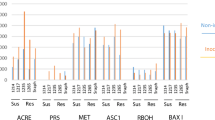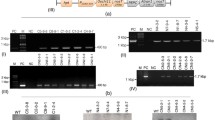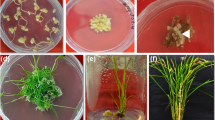Abstract.
Transgenic rice (Oryza sativa cv. Sasanishiki) overexpressing the wasabi defensin gene, a plant defensin effective against the rice blast fungus, was generated by Agrobacterium tumefaciens-mediated transformation. Twenty-two T2 homozygous lines harboring the wasabi defensin gene were challenged by the blast fungus. Transformants exhibited resistance to rice blast at various levels. The inheritance of the resistance over generations was investigated. T3 plants derived from two highly blast-resistant T2 lines (WT14-5 and WT43-5) were challenged with the blast fungus using the press-injured spots method. The average size of disease lesions of the transgenic line WT43-5 was reduced to about half of that of non-transgenic plants. The 5-kDa peptide, corresponding to the processed form of the wasabi defensin, was detected in the total protein fraction extracted from the T3 progeny. Transgenic rice plants overproducing wasabi defensin are expected to possess a durable and wide-spectrum resistance (i.e. field resistance) against various rice blast races.
Similar content being viewed by others
Author information
Authors and Affiliations
Additional information
Electronic Publication
Rights and permissions
About this article
Cite this article
Kanzaki, .H., Nirasawa, .S., Saitoh, .H. et al. Overexpression of the wasabi defensin gene confers enhanced resistance to blast fungus (Magnaporthe grisea) in transgenic rice. Theor Appl Genet 105, 809–814 (2002). https://doi.org/10.1007/s00122-001-0817-9
Received:
Accepted:
Issue Date:
DOI: https://doi.org/10.1007/s00122-001-0817-9




